In December 2012, Dr. Paivi Abernethy had an epiphany. As part of her PhD research, she was conducting interviews with various specialists about the fallout from torrential rain in Mid-Wales during the past summer. As a result of the deluge, tailings from historic silver mines overflowed and ran downhill; the concentration of lead resulted in the death of cattle. There were also serious concerns among locals about toxicity in community gardens.
She discovered, however, that the voice of a seemingly key partner – public health – was absent. “I was thinking, this is where public health is missing the ball,” she recalls. “That’s why I think that we really need to work with the environmental side, and other stakeholders, because they have the knowledge. And they don’t think about public health, so we have to highlight it. That’s what got me into climate change.”
More than a decade later, Abernethy is bringing her holistic, collaborative approach to Island Health as the new climate change and health lead. She took on the role, which falls under the Population and Public Health portfolio, in March. “It’s been a whirlwind,” she says. “But I love my new job. I’m still floating several feet above the ground.”
Dr. Paivi Abernethy, Climate Change and Health Lead
Abernethy received a PhD in social and ecological sustainability from the University of Waterloo, where she researched how to better integrate health and sustainability.
Her academic life has continued with a range of research and teaching roles; she’s currently an adjunct professor in public health at the University of Victoria and environmental studies at the University of Waterloo. And her postdoctoral work has often focused on what she calls “bringing together different ways of knowing for better decision-making.”
“How can we use the local and Indigenous knowledge to create better science?” asks Abernethy. “And how can we bring different ways of knowing together to have better evidence, and more meaningful evidence, to make decisions and change policy, and to make the science more meaningful for the people who should use it?”
As a climate change and health specialist at First Nations Health Authority, she advised on the health impacts of climate change and worked with B.C. First Nations to support community-led projects focused on climate resilience.
She’s taking a similar approach at Island Health – and a key goal is to integrate multiple voices and views. “Climate change is the biggest threat to public health. And it doesn’t happen in a pristine environment affecting healthy people in a well-prepared society,” says Abernethy. “It’s part of a range of cumulative impacts influencing health, and we can’t treat climate change as a singular, separate thing. It’s not just about mitigation – it impacts health care, it impacts people in the community, it impacts the environment.”
So where to start on such an all-encompassing issue? An initial effort involves identifying regional, climate-related health threats, and mapping out where communities, and Island Health, stand in terms of their approach to climate change. This will help determine strengths, gaps and issues – knowledge that can be used to pool resources and set priorities.
Supporting communities is a big focus for Abernethy. She recalls attending a recent meeting of the Union of BC Municipalities, where a northern B.C. mayor shared how nearby forest fires and blanketing smoke were resulting in mental health problems and despondent residents.
“How do we empower communities so they don’t feel paralyzed? So that we don’t create more problems, so that we actually find ways of strengthening the existing capacity, and bring First Nations and the neighbouring municipalities together where that’s not already happening,” says Abernethy. “So acknowledge where people are strong – but particularly pay attention to equity and trying to support those who may not be so strong.”

